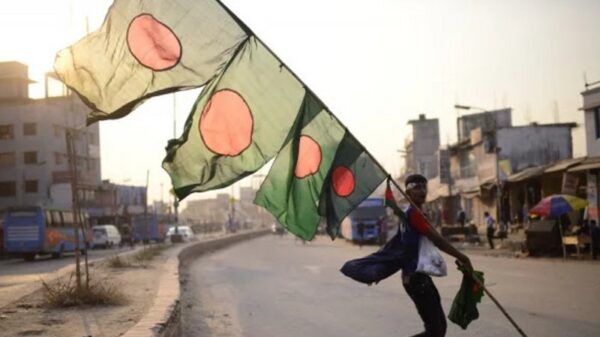A Ukrainian official has told the BBC they hope a New Year prisoner exchange with Russia will happen “any day,” although arrangements could fall through at the last minute.
Petro Yatsenko, from Ukraine’s Headquarters for the Treatment of Prisoners of War, said negotiations with Moscow over prisoner swaps have become more difficult in recent months since Russian forces began making significant advances on the front line.
There were just 10 exchanges in 2024, the lowest number since the full-scale invasion began. Ukraine doesn’t publish numbers of prisoners of war being held by Russia, but the total is thought to be over 8,000.
Russia has made significant gains on the battlefield this year, raising fears that the numbers of Ukrainians being captured is on the rise.
One of those brought home in the last swap, in September 2024, is Ukrainian marine Andriy Turas. In a flat in the Ukrainian city of Lviv, Andriy and his wife Lena tell me the remarkable story of their ordeal. Both of them were captured while defending the city of Mariupol in 2022.
“They held lectures with us about how Ukraine never existed,” says Lena, a combat medic, about her Russian captors. “They tried to exterminate our Ukrainian identity in our heads.”
Lena was released after two weeks of captivity. But the psychological scars of what she experienced in a Russian PoW facility remain. “We constantly heard screams, we knew the men [in our unit] were being tortured,” she says.
“They beat us mercilessly, with their fists, sticks, hammers, anything they could find,” Andriy says. “They stripped us naked in the cold and forced us to crawl on asphalt. Our legs were torn up, and we were left terrified and freezing.”
“The food was horrifying – sour cabbage and spoiled fish heads. It’s just a nightmare,” says the marine. “It’s like waking up from a bad dream in the middle of the night, drenched in sweat, terrified.”
Andriy’s incarceration lasted far longer than his wife’s – two-and-a-half years.
On his release in the prisoner exchange three months ago Andriy met his two-year-old son, Leon, for the first time. When the couple were captured by Russian forces, Lena didn’t know she was expecting.
“When I found out I was pregnant, I just cried, first of all from happiness, but then from sadness, because I couldn’t tell my husband.”
“I constantly wrote him letters, telling him that he would finally have a child he’d wanted for so long,” Lena says, her eyes shining. “But he didn’t get a single letter.”
I ask Andriy what it felt like to meet his son for the first time. “I thought I was the happiest person in the world,” he says, grinning.
While the BBC cannot independently verify everything Lena and Andriy told us, their accounts are corroborated by international organisations, who have interviewed hundreds of Ukrainian PoWs.
The UN says Russia subjects Ukrainian prisoners to “widespread and systematic torture and ill-treatment… including severe beatings, electric shocks, sexual violence, suffocation, prolonged stress positions, forced excessive exercise, sleep deprivation, mock executions, threats of violence and humiliation.”
In a statement to the BBC, the Russian Embassy in London said: “The allegations you have described are patently false. Captured Ukrainian militants are treated humanely and in full conformity with the provisions of the relevant Russian legislation and the Geneva Convention. They are provided with food of good quality, shelter, medical assistance, religious and intellectual nourishment.”
Andriy is undergoing rehabilitation at a medical facility in Lviv. But he still has time to enjoy the holidays with his wife and son. It’s the Turas family’s first Christmas together, and the best present for little Leon is having Daddy home.
But many Ukrainians are still desperately waiting for news of their loved ones. In central Kyiv, relatives and activists gather for a special Christmas demonstration to call for the release of Ukrainian prisoners.
They stand for hours in the biting cold, lining one of the main streets of the capital, as passing motorists honk their horns in a deafening cacophony of solidarity.
“We hope for a Christmas miracle,” says Tetiana, whose 24-year-old son Artem was captured almost three years ago, “My son’s release is my deepest wish. I’ve imagined our meeting 100 times, when he and I hug each other, and his eyes light up and he’s finally on his native land.”











































